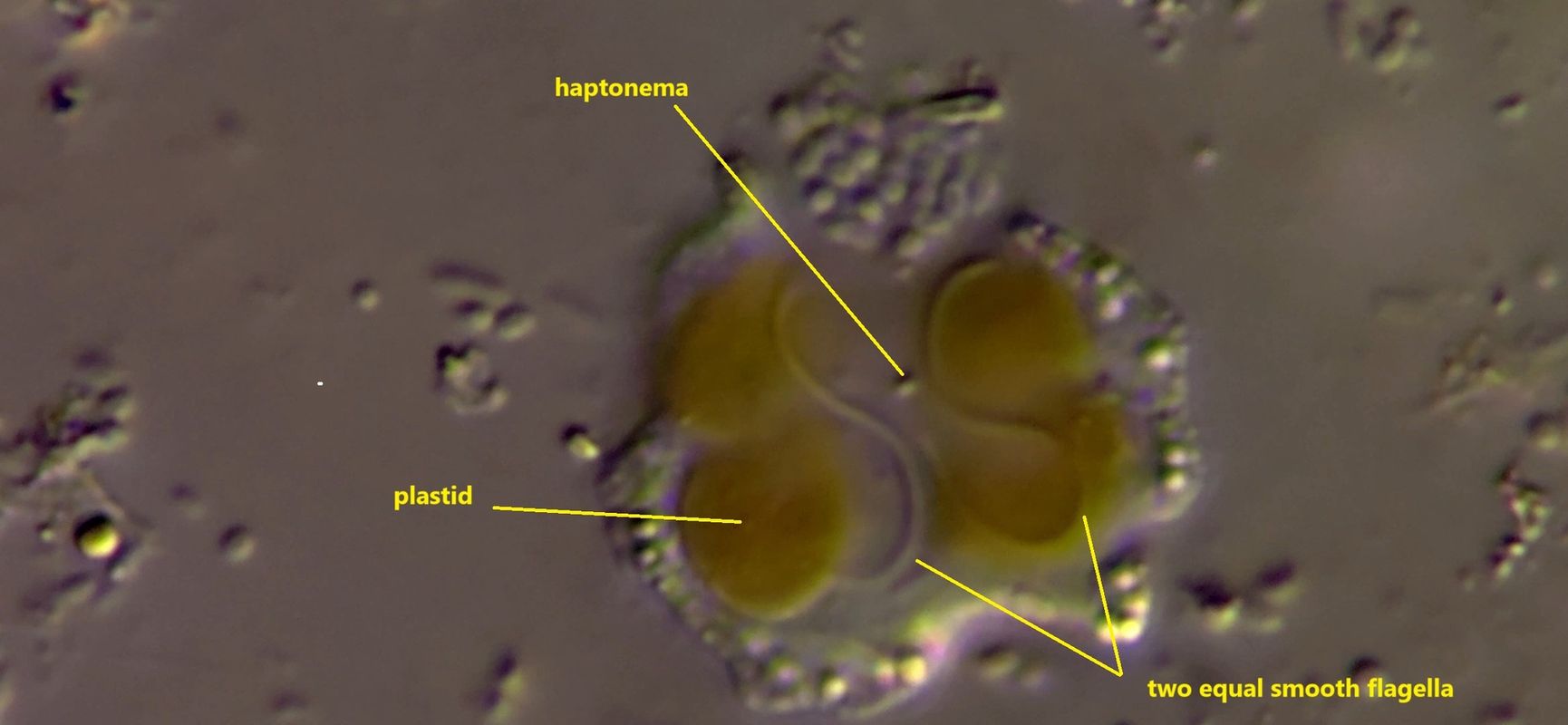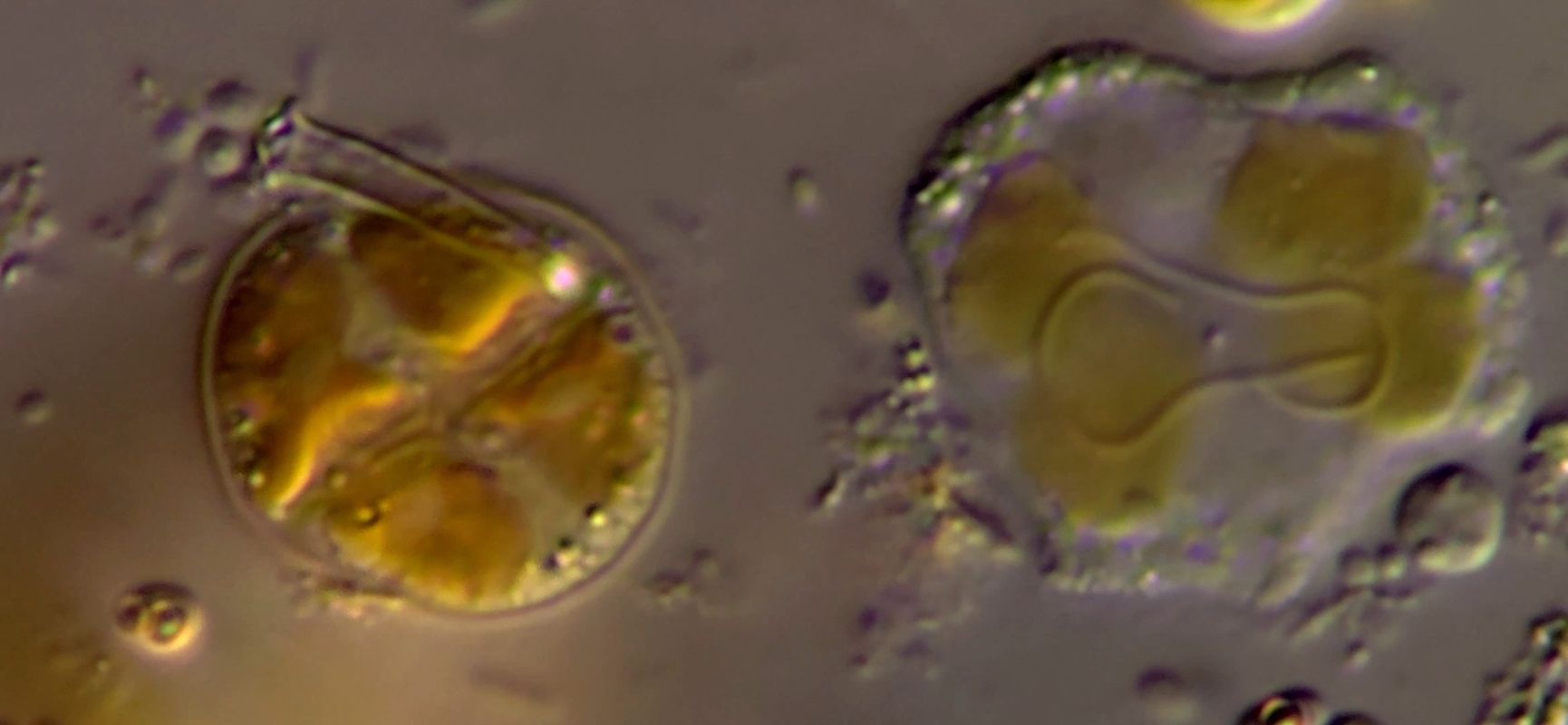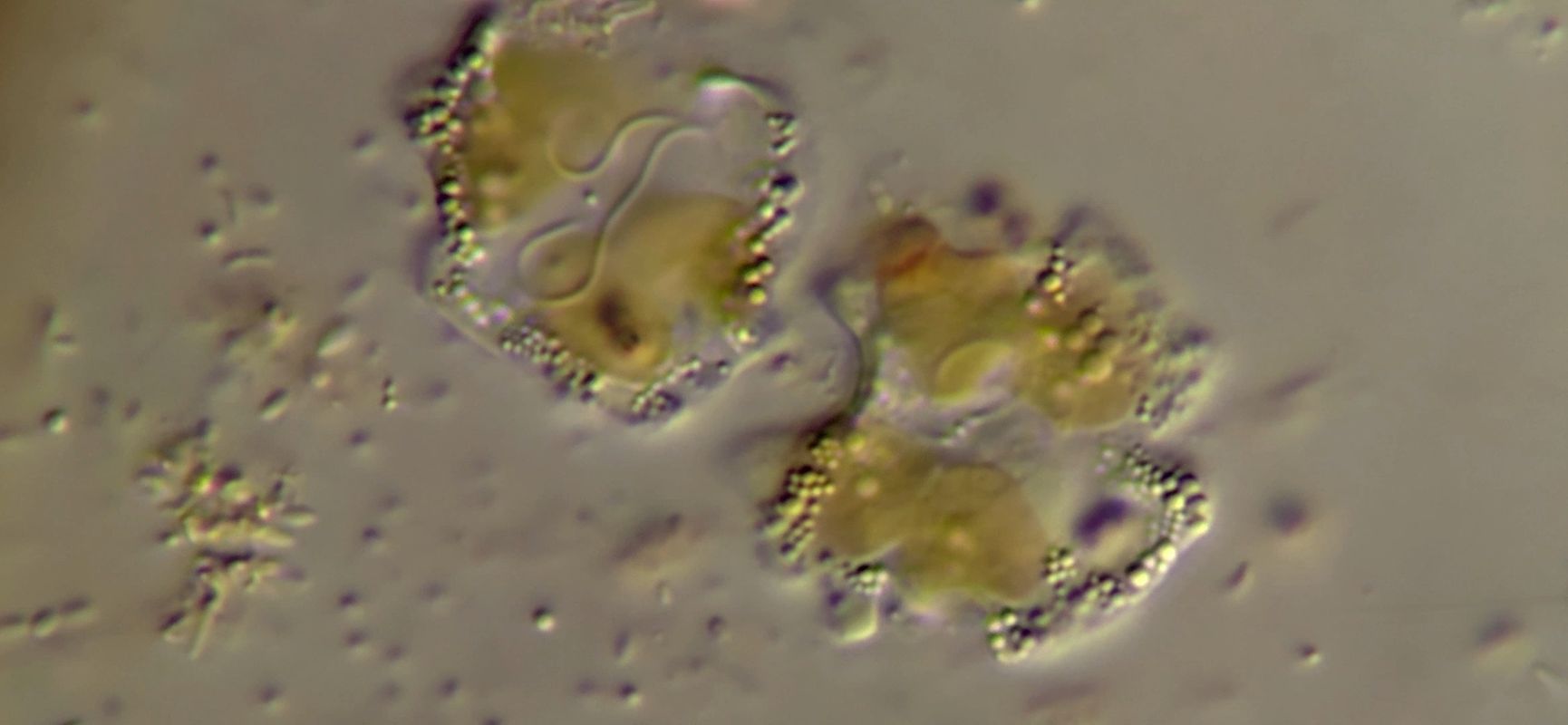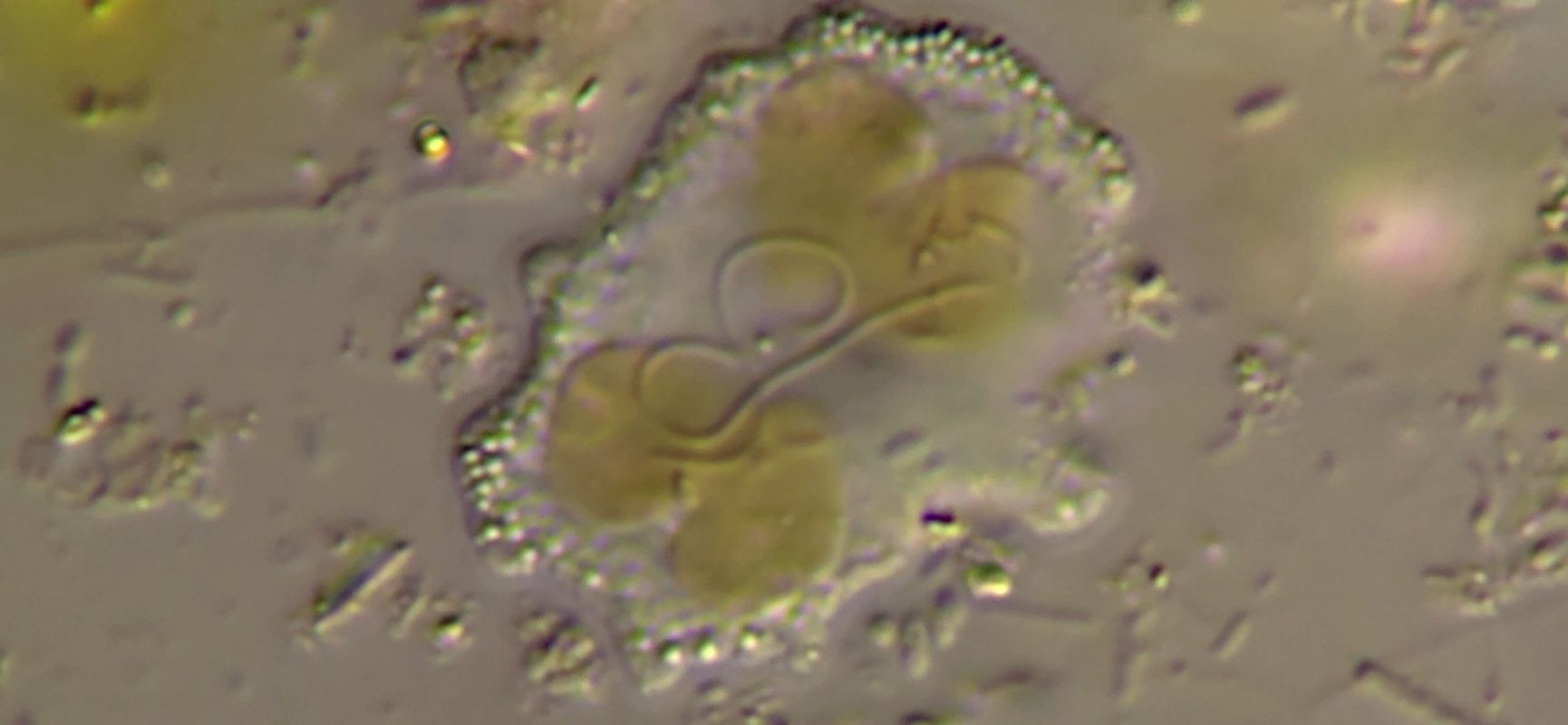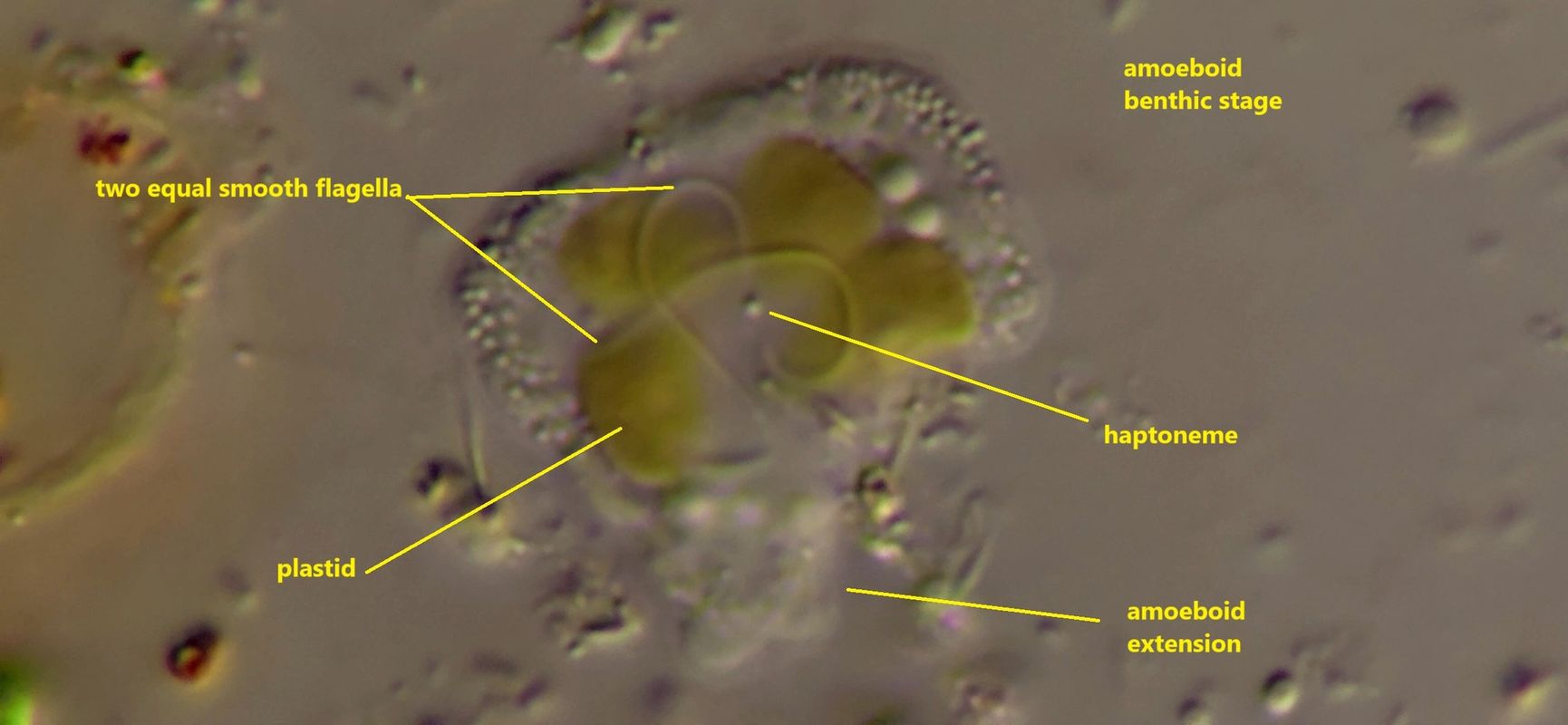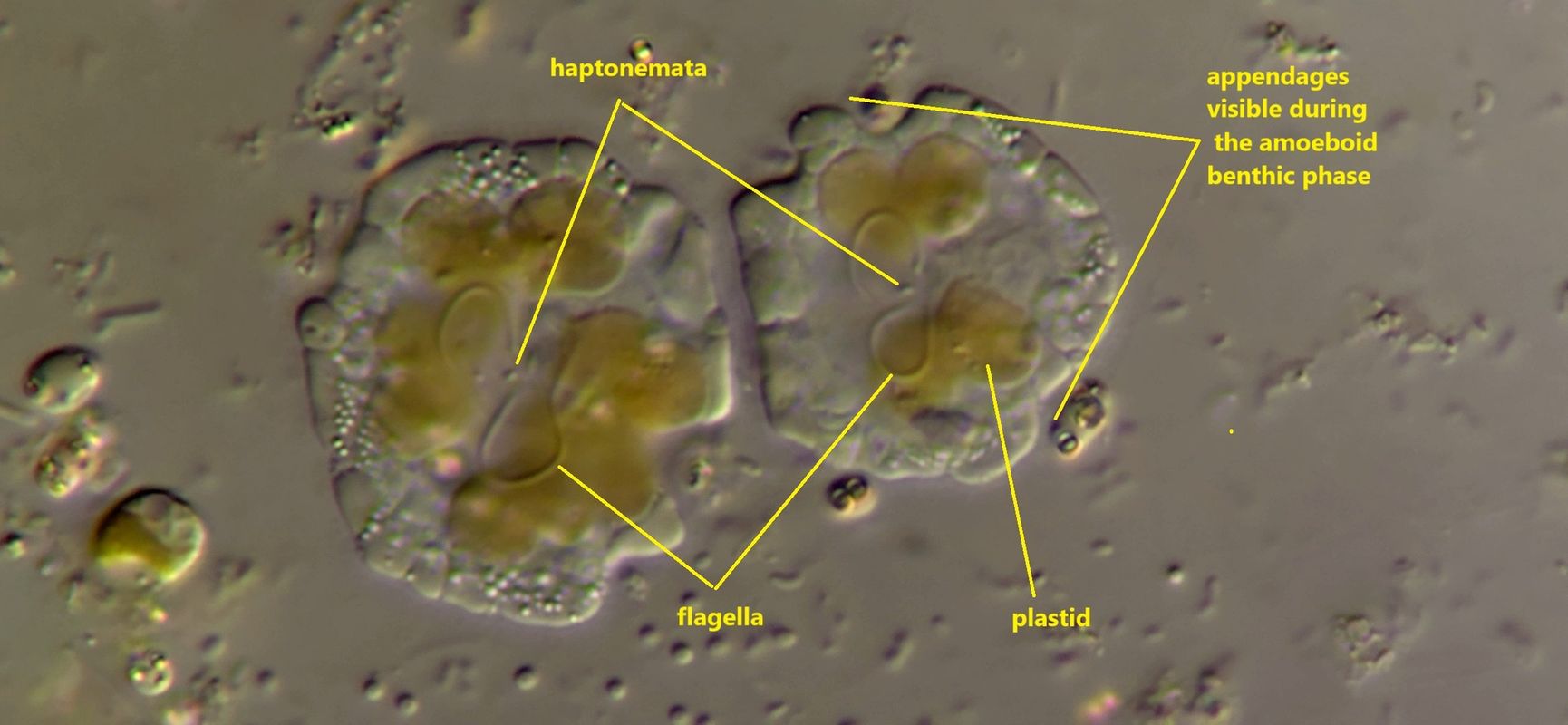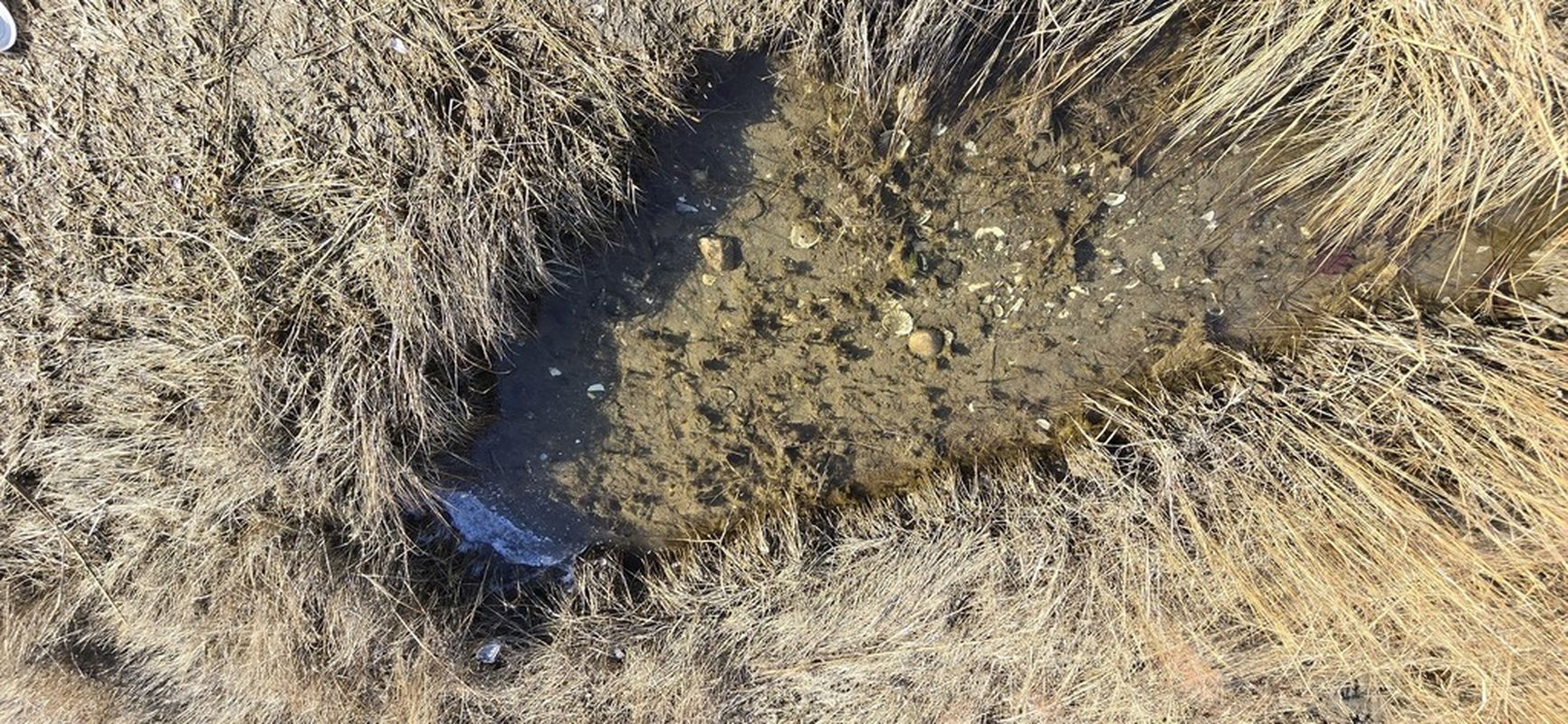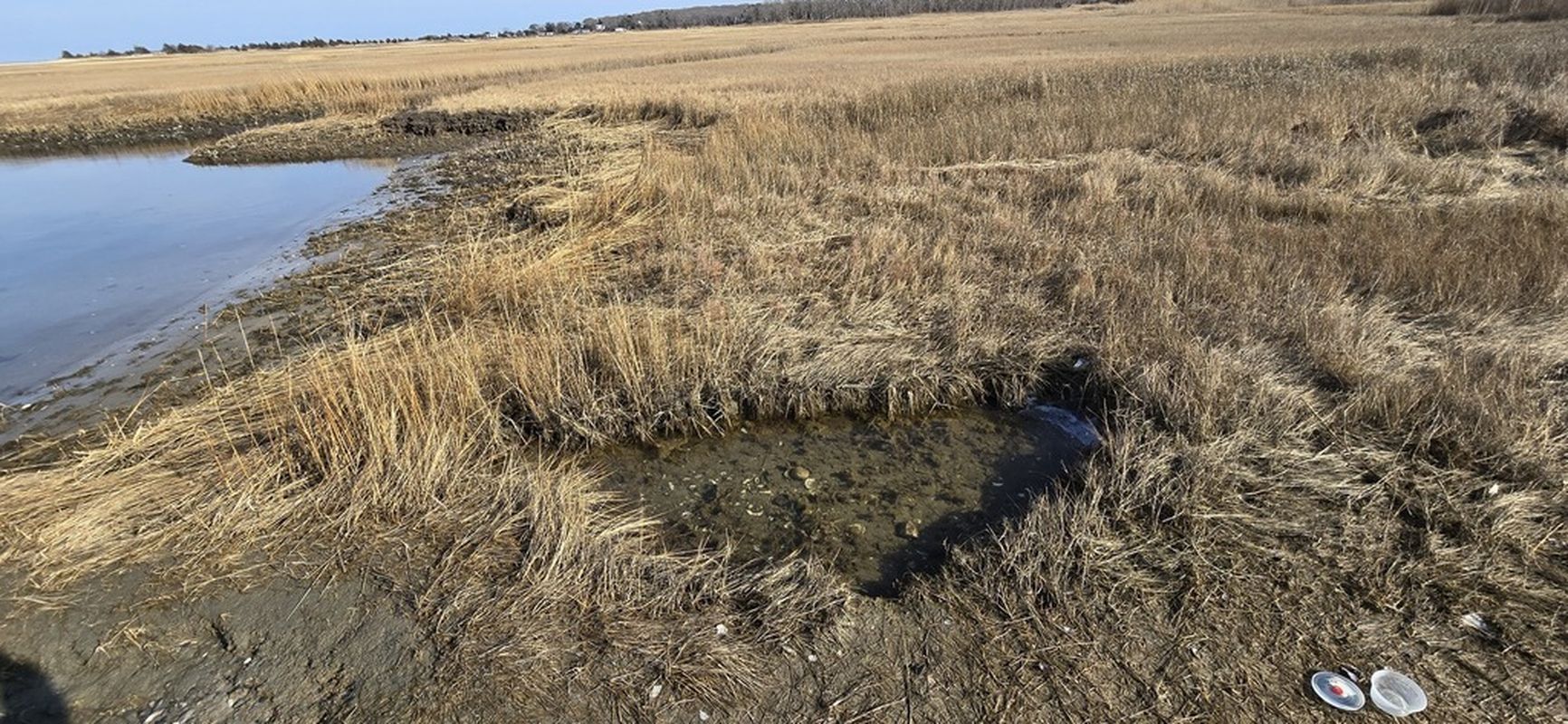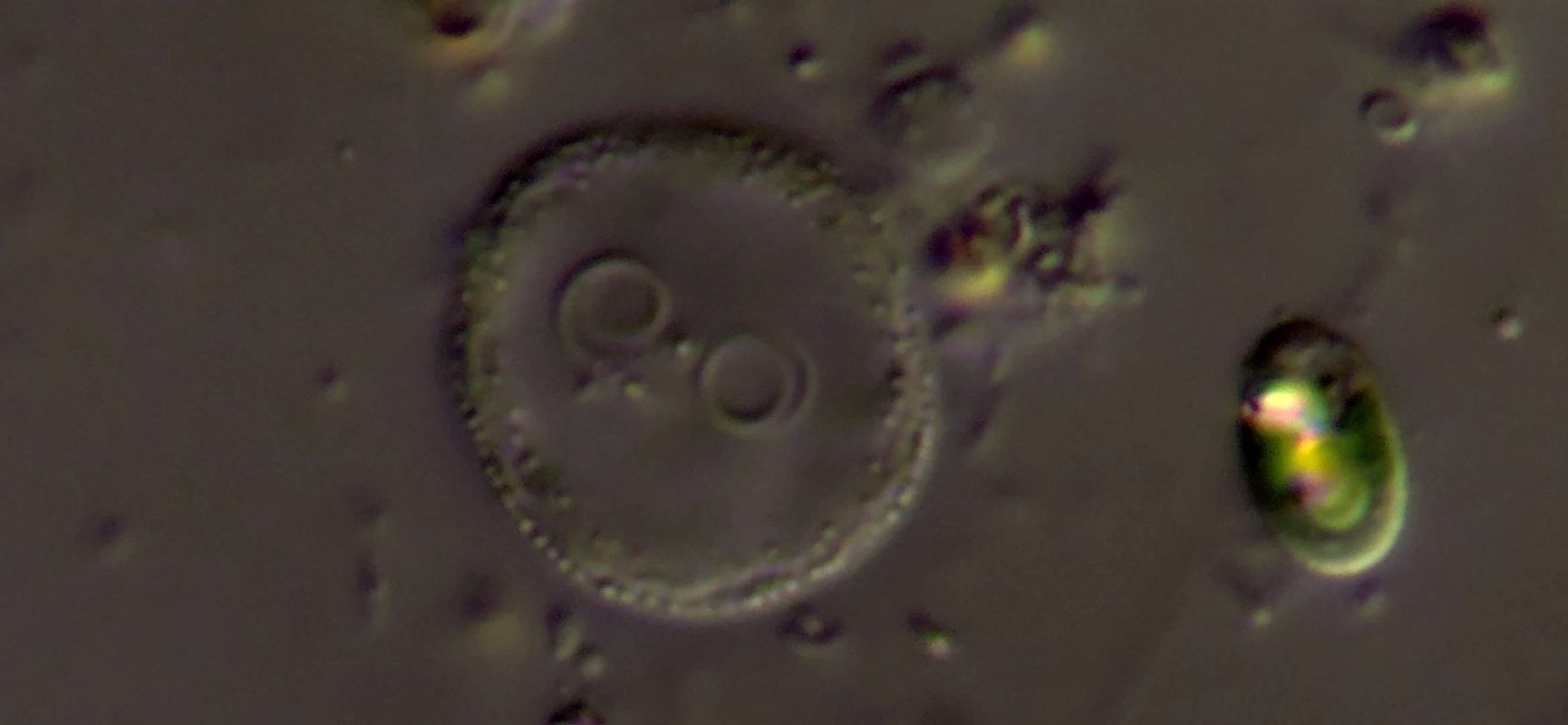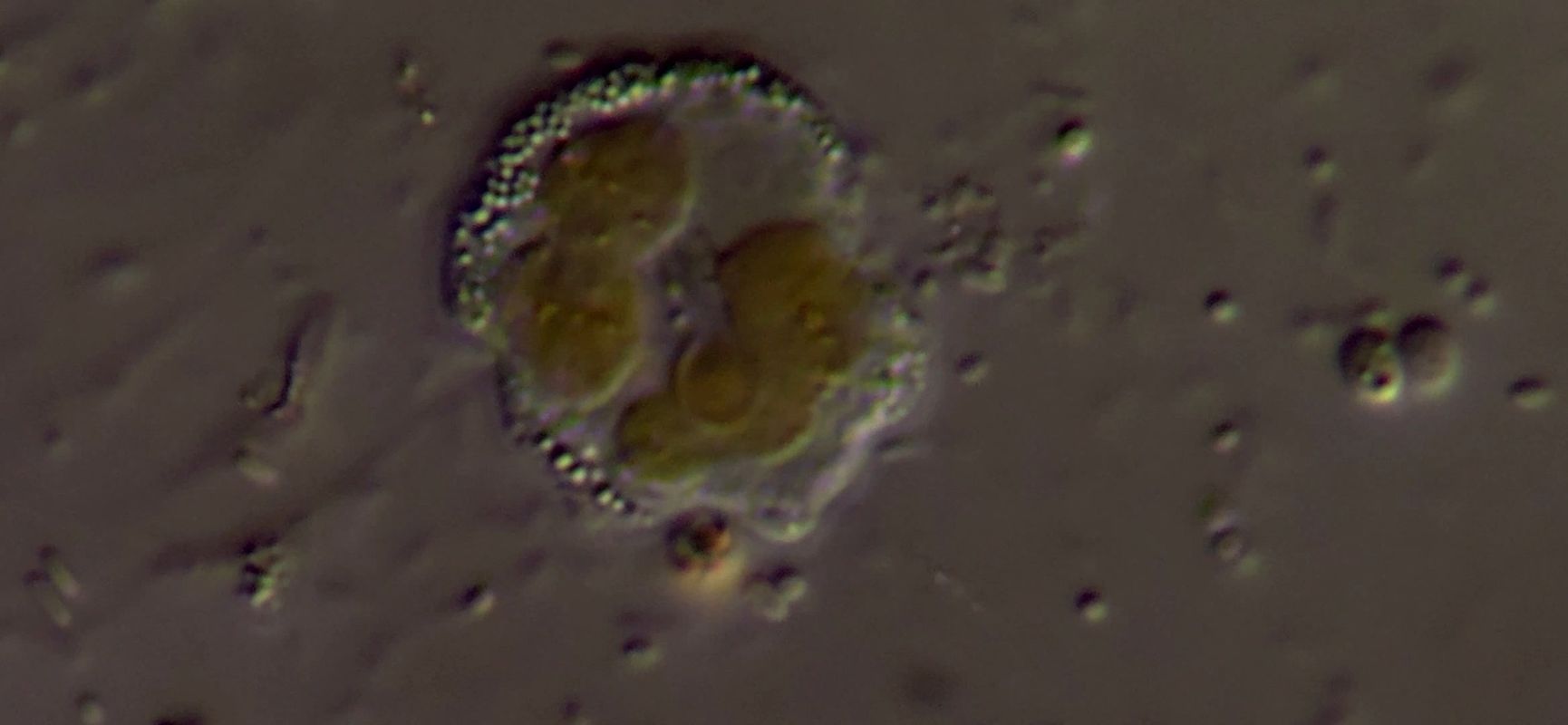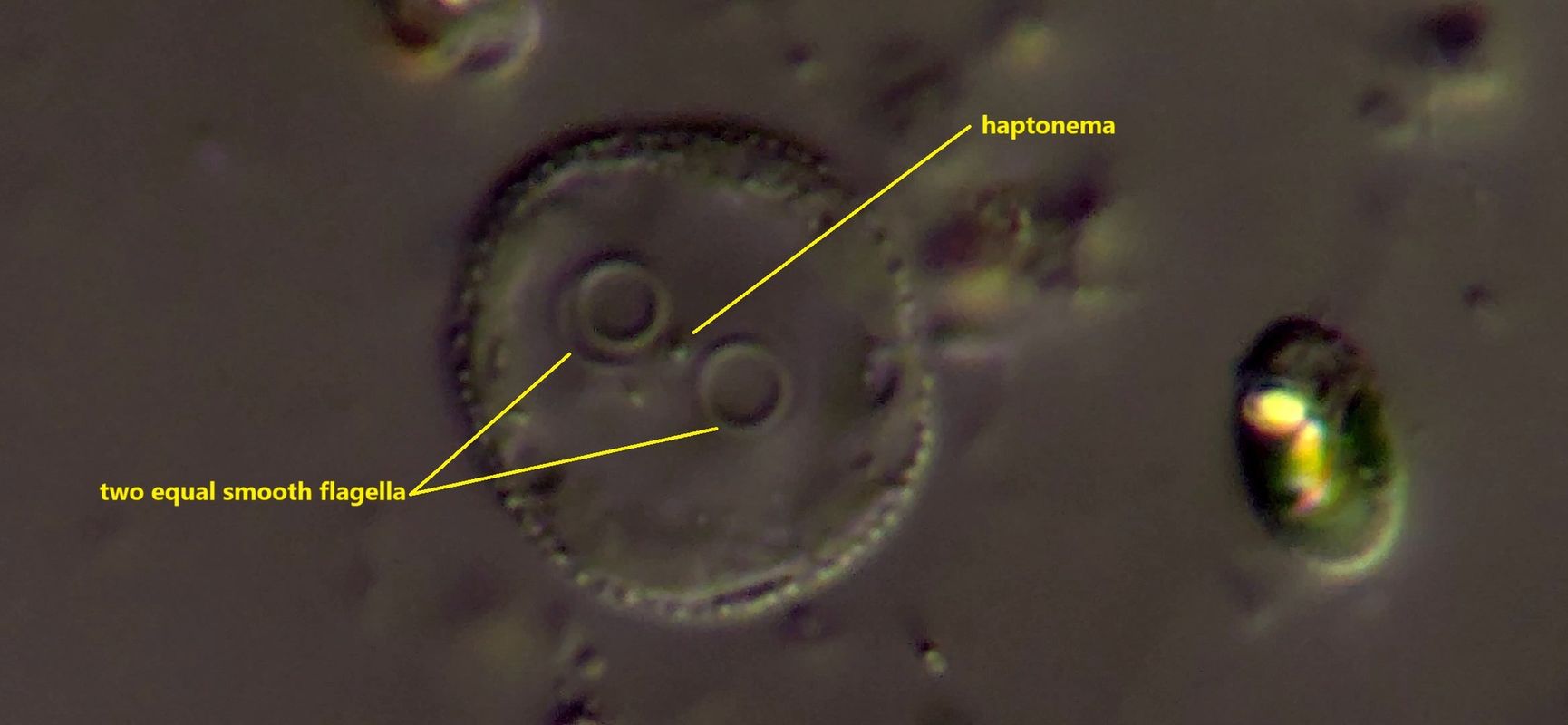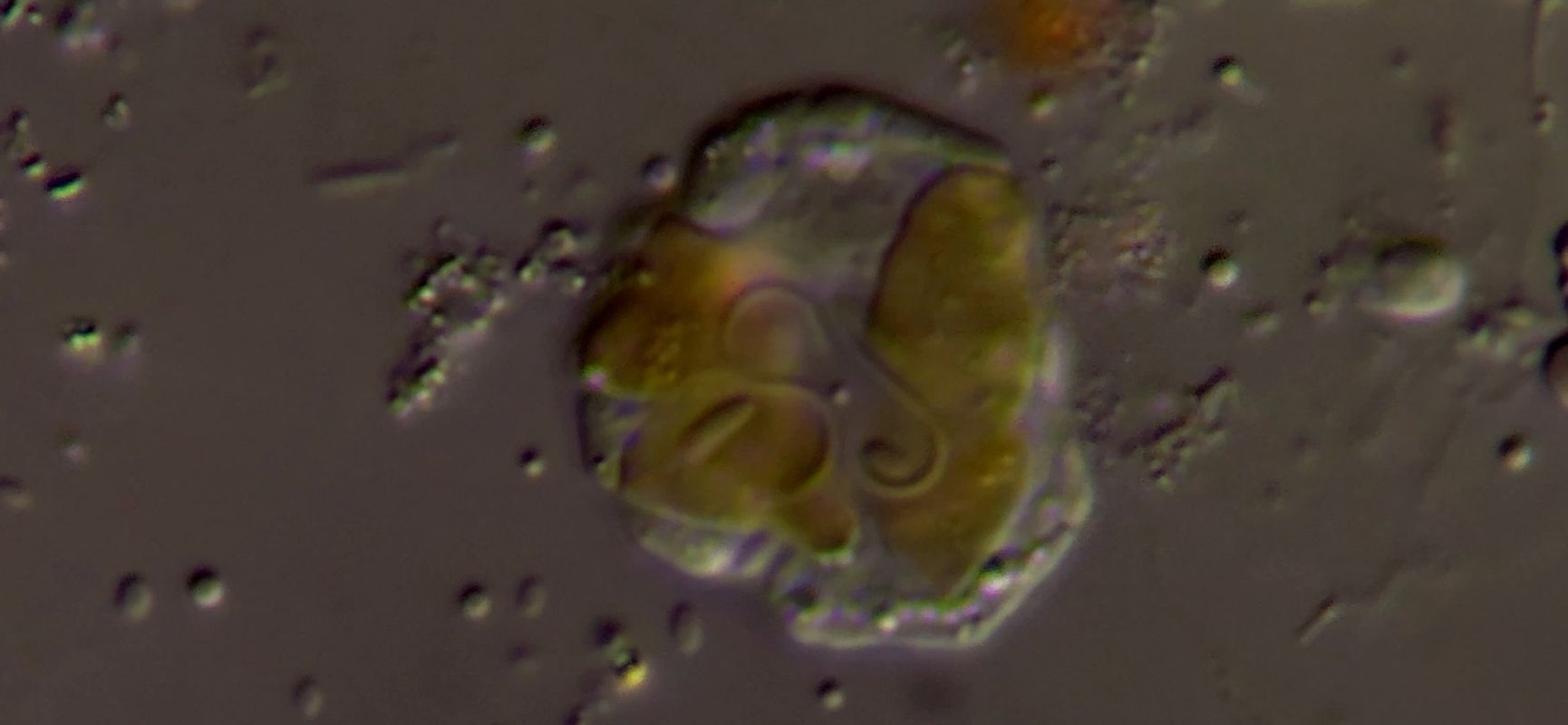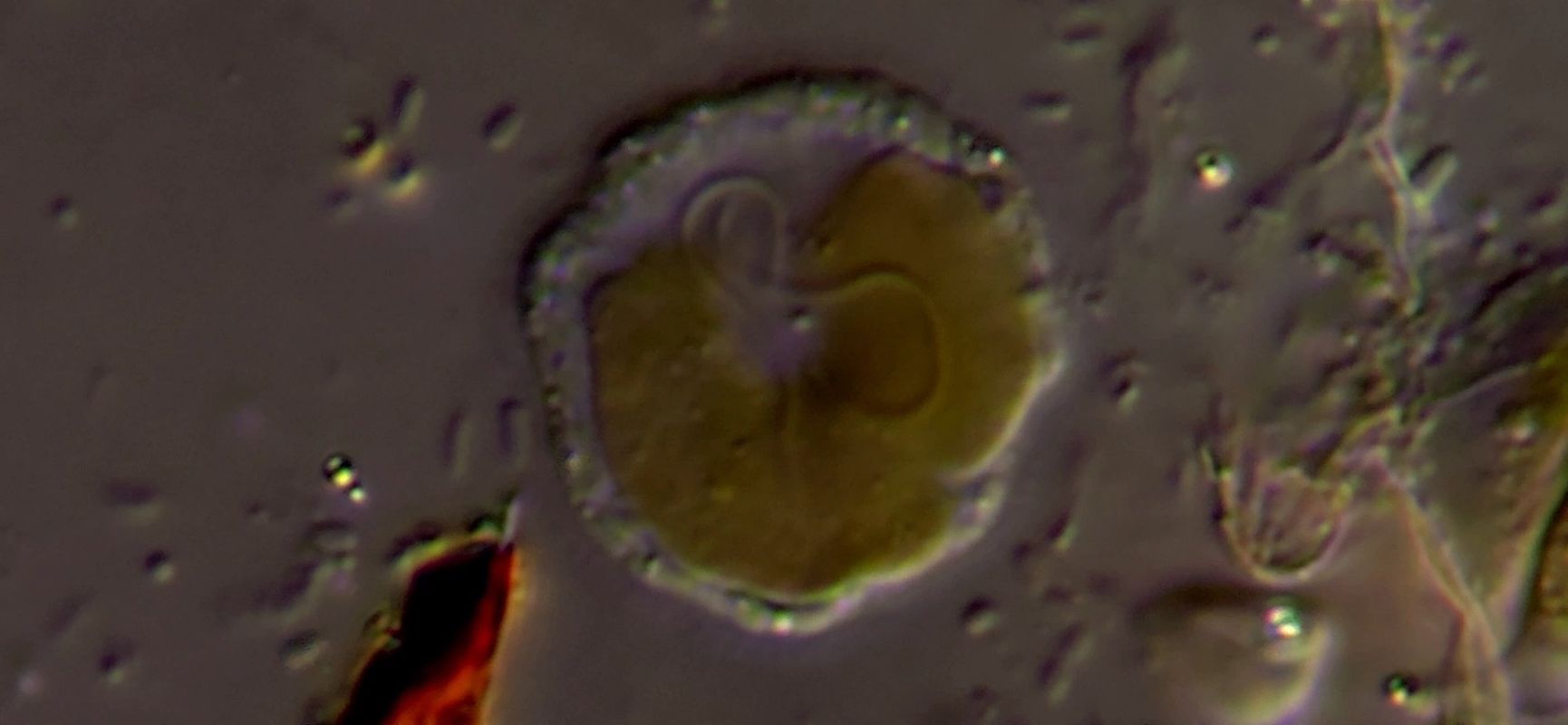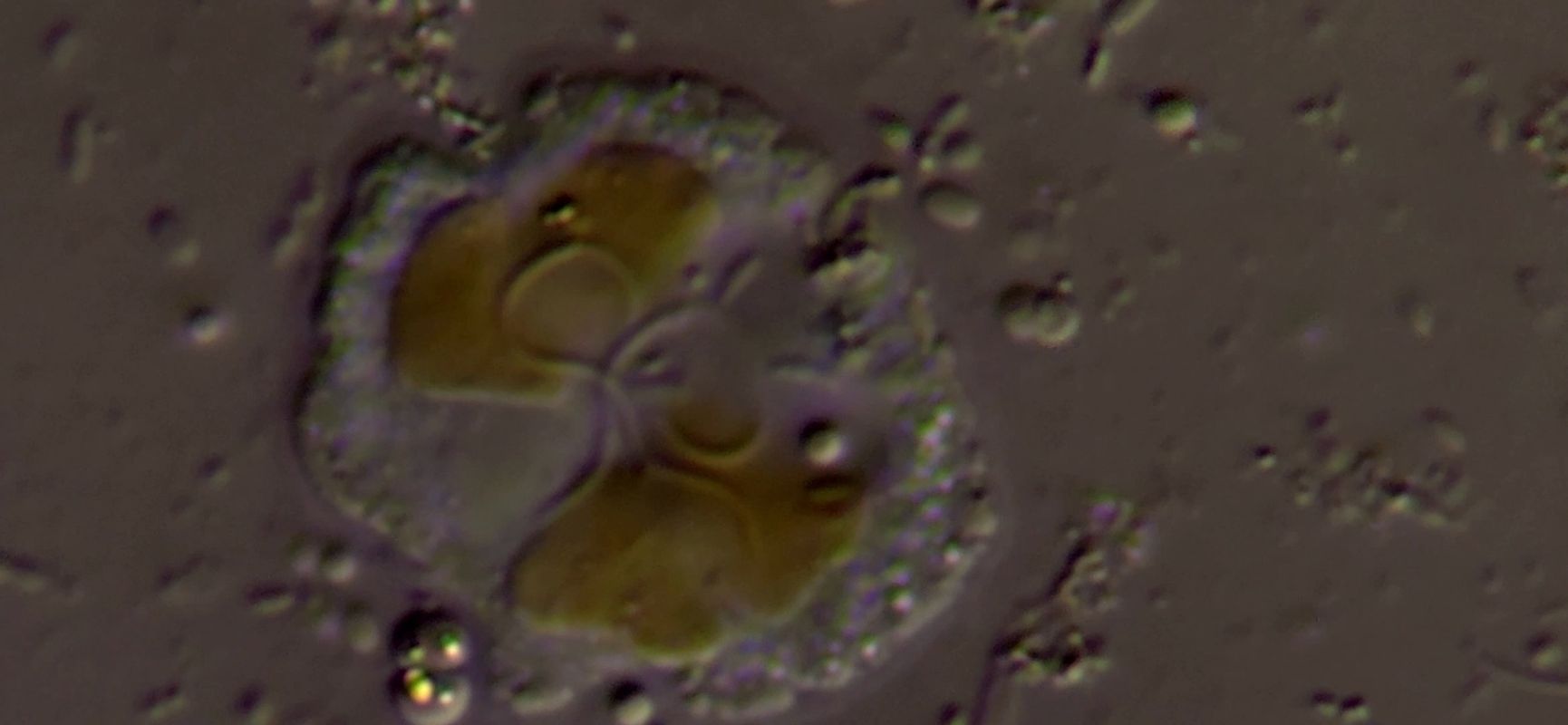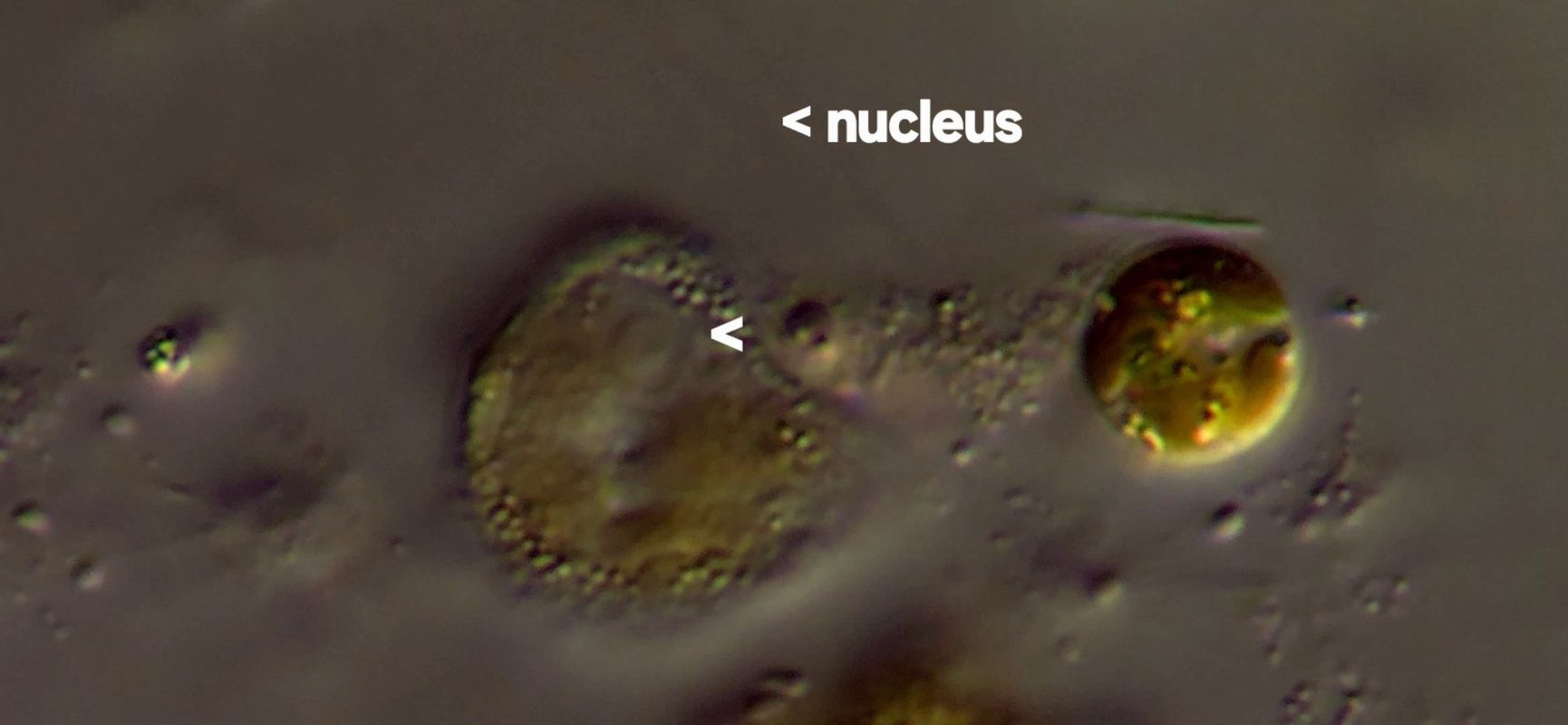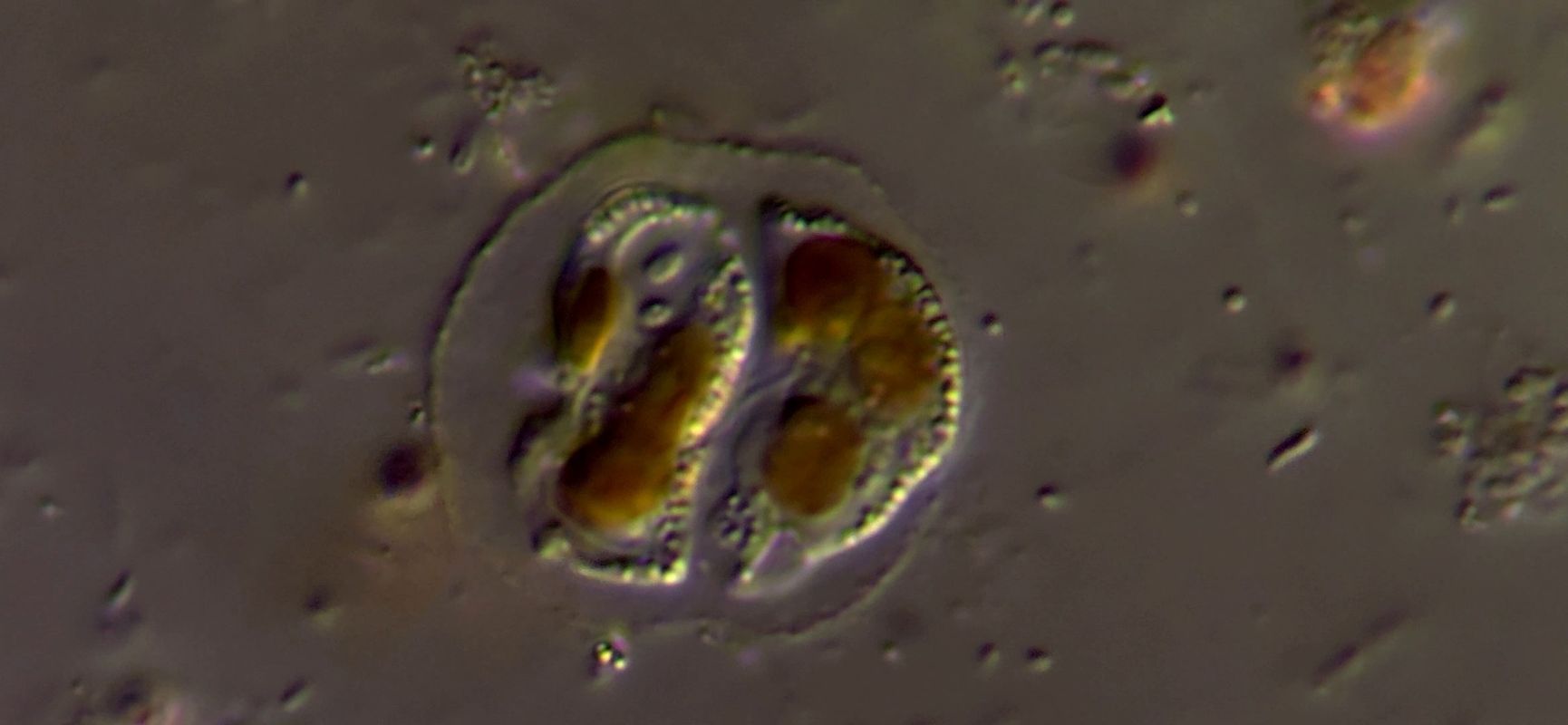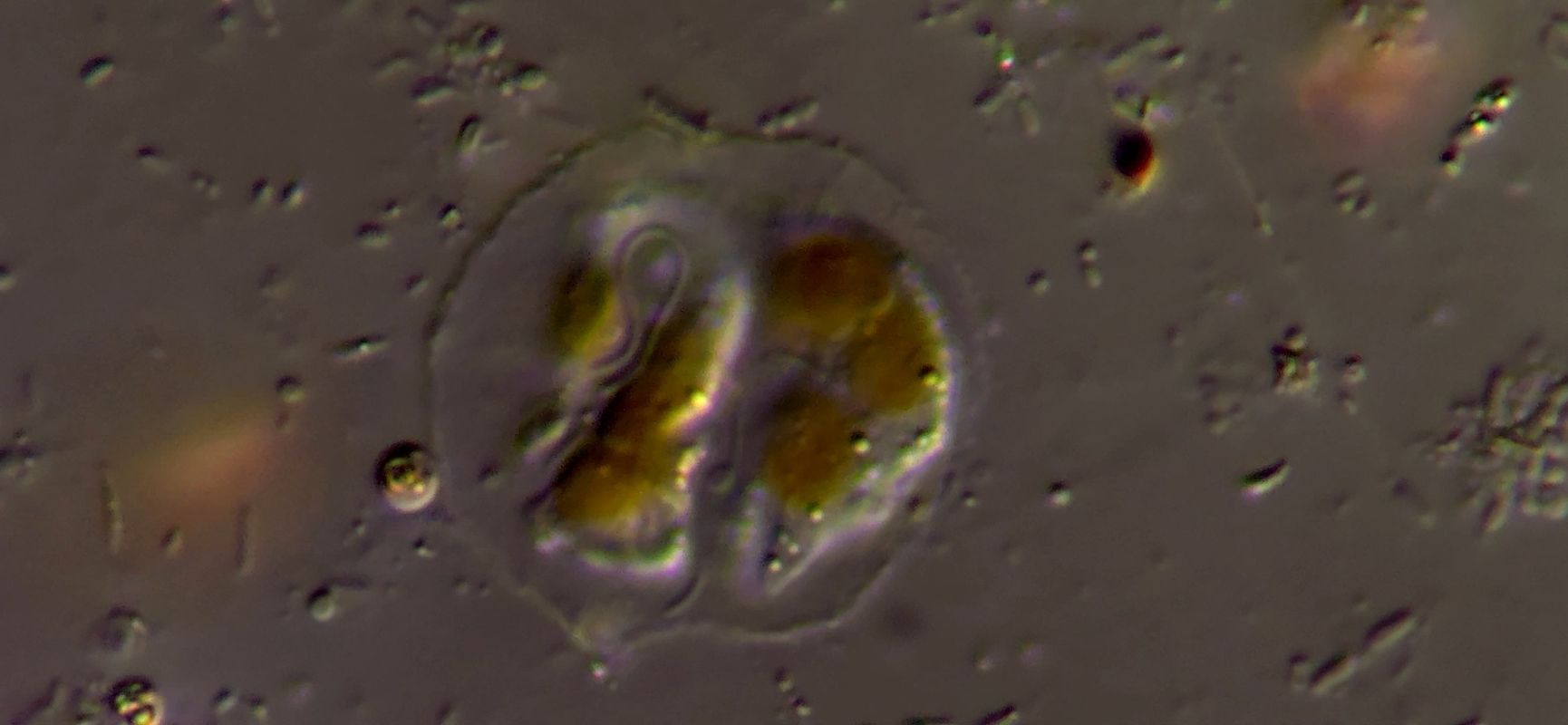Occurrence Feb 27, 2025, 9:09 AM
Prymnesium pigrum
United States of AmericaNew York
Record
- Dataset
- iNaturalist Research-grade Observations
- Basis of record
- Human observation
Taxon
- Scientific name
- Prymnesium pigrum
- Taxon ID
- 1611633
- Kingdom
- Chromista
- Phylum
- Haptophyta
- Class
- Coccolithophyceae
- Order
- Prymnesiales
- Family
- Prymnesiaceae
- Genus
- Prymnesium
- Rank
- species
Prymnesium pigrum (Geitler) Edvardsen et al.
KingdomChromistaPhylumHaptophytaClassPrymnesiophyceaeOrderPrymnesialesFamilyPrymnesiaceaeGenusPrymnesiumSpeciesPrymnesium pigrum
- Taxon ID not found
Prymnesium pigrum (Geitler) Edvardsen, Eikrem & Probert, 2011
DomainEukaryotaKingdomChromistaPhylumHaptophytaSubphylumHaptophytinaClassCoccolithophyceaeOrderPrymnesialesFamilyPrymnesiaceaeGenusPrymnesiumSpeciesPrymnesium pigrum
- Taxon ID not found
Location
- Continent
- North AmericaInferred
- Country or area
- United States of America
- State province
- New York
- Verbatim locality
- Springs, NY 11937, USA
- Decimal latitude
- 41.019Coordinate roundedAltered41.0186891111original
- Decimal longitude
- -72.145Coordinate roundedAltered-72.1453008345original
- Coordinate uncertainty in metres
- 2
- Geodetic datum
- EPSG:4326
Loading map...
Occurrence
- Occurrence ID
- Catalogue number
- 263980742
- Recorded by
- peptolab
- Sex
- Occurrence status
- PresentInferred
- Occurrence remarks
- Prymnesium pigrum (Geitler) Edvardsen, Eikrem & Probert, comb. nov. BASIONYM: Platychrysis pigra Geitler. Geitler (1930). Arch. Protistenk., 69: 631, pl. 25b, c, text fig. 14a–e Thanks to Yana Eglit for identifying this as a haptophyte belonging to the former genus Platychrysis. The Prymnesiophyta, also known as Haptophyta, is a group of autotrophic, planktonic uninucleate flagellates characterized by the presence of a haptonema (a filamentous, microtubule-supported appendage) that lies between two smooth, approximately equal flagella (Lee, 1999; Andersen, 2004). The name comes from the Greek hapsis = touch, and nema = thread. All or most of them are single-celled photosynthetic phytoplankton. "The genus Platychrysis was characterized by two homo dynamic flagella, a short noncoiling haptonema, nonmineralized organic scales and two morphologies: a dominant phase of a flattened, nonmotile, amoeboid cell and a motile stage. Platychrysis moestrupii has two distinct morphologies, a motile swimming phase and a benthic phase. When transforming to the benthic phase, cells flatten anterio-posteriorally to become irregular discs, which adhere to the slide surface" (1). However, Edvardsen et al. (2011) reinvestigated 37 members of the Prymnesiales using the complete nuclear-encoded SSU ribosomal gene, part of the LSU ribosomal gene and part of the plastid SSU ribosomal gene in addition to available morphological features. They found that the genus Platychrysis (Geitler) Gayral & Fresnel belonged in a new family, the Prymnesiaceae Conrad ex O.C. Schmidt emend. Edvardsen, Eikrem & Medlin. Because Platychrysis, fell within the Prymnesium clade, they reassigned all members to this genus (Edvardsen et al., 2011) (2). "Both P. moestrupii, and the (former) type species Platychrysis (now Prymnesium) pigrum (Geitler) Edvardsen, Eikrem & Medlin , have appendages visible during the amoeboid benthic phase with both flagella coiled around the haptonema (Chretiennot 1973), whilst the other three described species lack visible flagella at the non motile stage (Norris 1967; Gayral & Fresnel 1983). Cell division was observed to commence whilst cells were benthic, with the final stages of cytokinesis being completed once the cells released" (1). We see here the non-motile or benthic stage of Prymnesium pigrum (Geitler) Edvardsen, Eikrem & Medlin. I find many of these biflagellate cells adherent to floating coverglasses from a benthic sample taken from a small tidal pool at the edge of Acabonac Harbor estuary. Imaged in Nomarski DIC on Olympus BH2S using SPlan 100 1.25 oil immersion objective plus variable phone camera cropping on Samsung Galaxy S24. The cells measure 16-20 um. The cells are never moving or changing shape. They are flattened and mostly rounded with occasional small irregular extensions. There are two equal flagella which move usually very little that are tightly or loosely curled over the cell body never extending past the cell border. The haptonema is visible as a small dot between the flagella which stays in focus as you focus through the cell indicating it is adherrent to the underside of the coverglass. Visible in some cells is a round nucleus with central round nucleolus. Most cells contain 2 large golden brown plastids. The periphery of the cells has numerous refractile granules. "Although P. moestrupii is somewhat variable in size, it is substantially larger than other (former) Platychrysis species. Of these P. pigrum is the largest; in the motile stage, cells are 12–15 x 5–9 um, and in the benthic phase cells are 12–20 mm in diameter. Other Platychrysis species range in size from 2–3 x 8–9 um to 3–4 x 12um whilst motile, and 7–12 mm whilst benthic (Gayral & Fresnel 1983; Throndsen 1997). When first collected from the field, P. moestrupii cells were typically 50–65 mm in length; however, after 6 months grown in full strength K-medium, the average cell length gradually diminished to only 25–35 um" (1). Thus, we can infer from the work of Grant et al 2011 and their references that this population in the tidal pool is the former type species of the genus Platychrysis- P. pigra, now Prymnesium pigrum (Geitler) Edvardsen, Eikrem & Medlin 2011. Only this species and P. moestrupii Grant Waller and Wetherbee 2011 have visible flagella in the benthic stage. P. pigrum measures 12-20 um in the benthic stage while P. moestrupii is much larger as Grant et al 2011 point out. 1. Platychrysis moestrupii sp. nov. (Prymnesiophyceae): a new dimorphic, sand-dwelling haptophyte species from southeastern Australia. BRENNA GRANT,ROSS F. WALLER AND RICHARD WETHERBEE. Phycologia (2011) Volume 50 (6), 608–615 2. Ribosomal DNA phylogenies and a morphological revision provide the basis for a revised taxonomy of the Prymnesiales (Haptophyta) BENTE EDVARDSEN, WENCHE EIKREM, JAHN THRONDSEN, ALBERTO G. SAEZ, IAN PROBERT AND LINDA K. MEDLIN. Eur. J. Phycol. (2011) 46(3): 202–228
Other
- Record licence
- CC BY-NC 4.0Alteredhttps://creativecommons.org/licenses/by-nc/4.0/original
- Institution code
- iNaturalist
- Collection code
- Observations
- Dataset name
- iNaturalist research-grade observations
- Identifier
- 263980742
- Modified
- 2025-04-11T10:04:34Z
- References
- Rights holder
- peptolab
- GBIF ID
- 5087463881
Multimedia
- Format
- image/jpeg
- Identifier
- https://inaturali...9117/original.jpg
- References
- https://www.inatu.../photos/474329117
- Creator
- peptolab
- Publisher
- iNaturalist
- Rights holder
- peptolab
- Record licence
- http://creativecommons.org/licenses/by-nc/4.0/
- Created
- 2025-02-26T10:36:58-08:00
- Format
- image/jpeg
- Identifier
- https://inaturali...0242/original.jpg
- References
- https://www.inatu.../photos/474330242
- Creator
- peptolab
- Publisher
- iNaturalist
- Rights holder
- peptolab
- Record licence
- http://creativecommons.org/licenses/by-nc/4.0/
- Created
- 2025-02-26T10:36:58-08:00
- Format
- image/jpeg
- Identifier
- https://inaturali...9964/original.jpg
- References
- https://www.inatu.../photos/474329964
- Creator
- peptolab
- Publisher
- iNaturalist
- Rights holder
- peptolab
- Record licence
- http://creativecommons.org/licenses/by-nc/4.0/
- Created
- 2025-02-26T14:47:34-08:00
- Format
- image/jpeg
- Identifier
- https://inaturali...9928/original.jpg
- References
- https://www.inatu.../photos/474329928
- Creator
- peptolab
- Publisher
- iNaturalist
- Rights holder
- peptolab
- Record licence
- http://creativecommons.org/licenses/by-nc/4.0/
- Created
- 2025-02-26T14:47:34-08:00
- Format
- image/jpeg
- Identifier
- https://inaturali...0237/original.jpg
- References
- https://www.inatu.../photos/474330237
- Creator
- peptolab
- Publisher
- iNaturalist
- Rights holder
- peptolab
- Record licence
- http://creativecommons.org/licenses/by-nc/4.0/
- Created
- 2025-02-26T14:47:34-08:00
- Format
- image/jpeg
- Identifier
- https://inaturali...9123/original.jpg
- References
- https://www.inatu.../photos/474329123
- Creator
- peptolab
- Publisher
- iNaturalist
- Rights holder
- peptolab
- Record licence
- http://creativecommons.org/licenses/by-nc/4.0/
- Created
- 2025-02-26T15:12:17-08:00
- Format
- image/jpeg
- Identifier
- https://inaturali...9125/original.jpg
- References
- https://www.inatu.../photos/474329125
- Creator
- peptolab
- Publisher
- iNaturalist
- Rights holder
- peptolab
- Record licence
- http://creativecommons.org/licenses/by-nc/4.0/
- Created
- 2025-02-26T15:12:17-08:00
- Format
- image/gif
- Identifier
- https://inaturali...9517/original.gif
- References
- https://www.inatu.../photos/474329517
- Creator
- peptolab
- Publisher
- iNaturalist
- Rights holder
- peptolab
- Record licence
- http://creativecommons.org/licenses/by-nc/4.0/
- Created
- 2025-02-27T14:09Z
- Format
- image/jpeg
- Identifier
- https://inaturali...0498/original.jpg
- References
- https://www.inatu.../photos/474330498
- Creator
- peptolab
- Publisher
- iNaturalist
- Rights holder
- peptolab
- Record licence
- http://creativecommons.org/licenses/by-nc/4.0/
- Created
- 2025-02-27T14:09Z
- Format
- image/gif
- Identifier
- https://inaturali...8949/original.gif
- References
- https://www.inatu.../photos/474328949
- Creator
- peptolab
- Publisher
- iNaturalist
- Rights holder
- peptolab
- Record licence
- http://creativecommons.org/licenses/by-nc/4.0/
- Created
- 2025-02-27T14:09Z
- Format
- image/gif
- Identifier
- https://inaturali...9653/original.gif
- References
- https://www.inatu.../photos/474329653
- Creator
- peptolab
- Publisher
- iNaturalist
- Rights holder
- peptolab
- Record licence
- http://creativecommons.org/licenses/by-nc/4.0/
- Created
- 2025-02-27T14:09Z
- Format
- image/gif
- Identifier
- https://inaturali...9526/original.gif
- References
- https://www.inatu.../photos/474329526
- Creator
- peptolab
- Publisher
- iNaturalist
- Rights holder
- peptolab
- Record licence
- http://creativecommons.org/licenses/by-nc/4.0/
- Created
- 2025-02-27T14:09Z
- Format
- image/jpeg
- Identifier
- https://inaturali...0502/original.jpg
- References
- https://www.inatu.../photos/474330502
- Creator
- peptolab
- Publisher
- iNaturalist
- Rights holder
- peptolab
- Record licence
- http://creativecommons.org/licenses/by-nc/4.0/
- Created
- 2025-02-27T14:09Z
- Format
- image/gif
- Identifier
- https://inaturali...9599/original.gif
- References
- https://www.inatu.../photos/474329599
- Creator
- peptolab
- Publisher
- iNaturalist
- Rights holder
- peptolab
- Record licence
- http://creativecommons.org/licenses/by-nc/4.0/
- Created
- 2025-02-27T14:09Z
- Format
- image/gif
- Identifier
- https://inaturali...0356/original.gif
- References
- https://www.inatu.../photos/474330356
- Creator
- peptolab
- Publisher
- iNaturalist
- Rights holder
- peptolab
- Record licence
- http://creativecommons.org/licenses/by-nc/4.0/
- Created
- 2025-02-27T14:09Z
- Format
- image/gif
- Identifier
- https://inaturali...9510/original.gif
- References
- https://www.inatu.../photos/474329510
- Creator
- peptolab
- Publisher
- iNaturalist
- Rights holder
- peptolab
- Record licence
- http://creativecommons.org/licenses/by-nc/4.0/
- Created
- 2025-02-27T14:09Z
- Format
- image/jpeg
- Identifier
- https://inaturali...9961/original.jpg
- References
- https://www.inatu.../photos/474329961
- Creator
- peptolab
- Publisher
- iNaturalist
- Rights holder
- peptolab
- Record licence
- http://creativecommons.org/licenses/by-nc/4.0/
- Created
- 2025-02-27T16:51:27-08:00
- Format
- image/jpeg
- Identifier
- https://inaturali...9947/original.jpg
- References
- https://www.inatu.../photos/474329947
- Creator
- peptolab
- Publisher
- iNaturalist
- Rights holder
- peptolab
- Record licence
- http://creativecommons.org/licenses/by-nc/4.0/
- Created
- 2025-02-27T16:51:27-08:00
- Format
- image/jpeg
- Identifier
- https://inaturali...9962/original.jpg
- References
- https://www.inatu.../photos/474329962
- Creator
- peptolab
- Publisher
- iNaturalist
- Rights holder
- peptolab
- Record licence
- http://creativecommons.org/licenses/by-nc/4.0/
- Created
- 2025-02-27T16:51:27-08:00
- Format
- image/jpeg
- Identifier
- https://inaturali...0240/original.jpg
- References
- https://www.inatu.../photos/474330240
- Creator
- peptolab
- Publisher
- iNaturalist
- Rights holder
- peptolab
- Record licence
- http://creativecommons.org/licenses/by-nc/4.0/
- Created
- 2025-02-27T16:51:27-08:00
- Format
- image/jpeg
- Identifier
- https://inaturali...9929/original.jpg
- References
- https://www.inatu.../photos/474329929
- Creator
- peptolab
- Publisher
- iNaturalist
- Rights holder
- peptolab
- Record licence
- http://creativecommons.org/licenses/by-nc/4.0/
- Created
- 2025-02-27T16:51:27-08:00
- Format
- image/jpeg
- Identifier
- https://inaturali...9950/original.jpg
- References
- https://www.inatu.../photos/474329950
- Creator
- peptolab
- Publisher
- iNaturalist
- Rights holder
- peptolab
- Record licence
- http://creativecommons.org/licenses/by-nc/4.0/
- Created
- 2025-02-27T16:51:27-08:00
- Format
- image/jpeg
- Identifier
- https://inaturali...9128/original.jpg
- References
- https://www.inatu.../photos/474329128
- Creator
- peptolab
- Publisher
- iNaturalist
- Rights holder
- peptolab
- Record licence
- http://creativecommons.org/licenses/by-nc/4.0/
- Created
- 2025-02-27T16:51:27-08:00
- Format
- image/jpeg
- Identifier
- https://inaturali...0263/original.jpg
- References
- https://www.inatu.../photos/474330263
- Creator
- peptolab
- Publisher
- iNaturalist
- Rights holder
- peptolab
- Record licence
- http://creativecommons.org/licenses/by-nc/4.0/
- Created
- 2025-02-27T16:51:27-08:00
- Format
- image/jpeg
- Identifier
- https://inaturali...0249/original.jpg
- References
- https://www.inatu.../photos/474330249
- Creator
- peptolab
- Publisher
- iNaturalist
- Rights holder
- peptolab
- Record licence
- http://creativecommons.org/licenses/by-nc/4.0/
- Created
- 2025-02-27T16:51:27-08:00
- Format
- image/jpeg
- Identifier
- https://inaturali...0248/original.jpg
- References
- https://www.inatu.../photos/474330248
- Creator
- peptolab
- Publisher
- iNaturalist
- Rights holder
- peptolab
- Record licence
- http://creativecommons.org/licenses/by-nc/4.0/
- Created
- 2025-02-27T16:51:27-08:00
- Format
- image/jpeg
- Identifier
- https://inaturali...9132/original.jpg
- References
- https://www.inatu.../photos/474329132
- Creator
- peptolab
- Publisher
- iNaturalist
- Rights holder
- peptolab
- Record licence
- http://creativecommons.org/licenses/by-nc/4.0/
- Created
- 2025-02-27T17:04:05-08:00
- Format
- image/jpeg
- Identifier
- https://inaturali...9948/original.jpg
- References
- https://www.inatu.../photos/474329948
- Creator
- peptolab
- Publisher
- iNaturalist
- Rights holder
- peptolab
- Record licence
- http://creativecommons.org/licenses/by-nc/4.0/
- Created
- 2025-02-27T17:14:33-08:00
- Format
- image/jpeg
- Identifier
- https://inaturali...9926/original.jpg
- References
- https://www.inatu.../photos/474329926
- Creator
- peptolab
- Publisher
- iNaturalist
- Rights holder
- peptolab
- Record licence
- http://creativecommons.org/licenses/by-nc/4.0/
- Created
- 2025-02-27T17:14:33-08:00
Citation
- Please use this citation in publications
- iNaturalist contributors, iNaturalist (2025). iNaturalist Research-grade Observations. iNaturalist.org. Occurrence dataset https://doi.org/10.15468/ab3s5x accessed via GBIF.org on 2025-08-08. https://gbif.org/occurrence/5087463881
- API access
- Dataset
- iNaturalist Research-grade Observations
- Publisher
- iNaturalist.org
- Last crawled
- 2025-08-02T12:45:50.757
